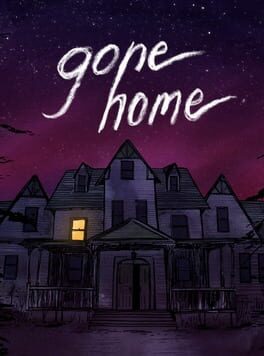Gone Home was released August 15, 2013 by The Fullbright Company, designed by Steve Gaynor (who worked on the BioShock games) and built on the Unity engine, whose story starts you off with a brief voicemail from the airport (although actually featuring the airport would be too much work apparently) and finally, at the Greenbriar home. You play as Kaitlin Greenbriar, a twentysomething college grad who just came back from her trip to Europe, only to find the place completely empty, with boxes and the like scattered here and there with your name on them. Alas, you have gone home; but the developers also left anything of sentimental value like any form of linear storytelling at the door outside.
Playing through this game was a chore, at best. I kept on asking myself what am I doing as I walked through the decrepit hallways; struggling what to make of my predicament. As I went towards the bathroom sink to wash up, I came to the unpleasant realization that there was not a single mirror in this game. Is the Greenbriar family a bunch of a vampires, or are they just not very self-conscious? I think that sentiment might be the deepest thing about this game game.
Still, graphically speaking, the graphics aren't all that bad. A lot of things are high-resolution, and its refreshing to see an indie game that isn't retro for the sake of being lazy. Still, the graphics are by no means a groundbreaking use of the Unity engine.
And, since there are no mirrors in this game to tell you who you are; you're stuck living in the shadow of Sam and Lonnie's sapphic relationship, your parent's marriage troubles, and some other irrelevant shit -- like your aunt dying and that's why you have a mansion for a home. The only way I feel one can empathize is if you're going through a similar situation. Otherwise, its just a well polished house explorer, with a unnecessarily convoluted plot that masquerades as an avant-garde discovery thriller.
Take out that context, and Gone Home is merely a caricature, perfectly summing up how to not address LGBT representation, which at the time was still fairly nascent. It treats the attribute of being a lesbian as a convenient prop, ripe to be picked as an excuse for clever storytelling. Still, for this gimmick, gaming journalists will go wild to prove that indie games can also get 9/10 scores without the use of bribes. Beg to differ in opinion? Congratulations, you are now a sexist.
(This review was written about a decade ago and updated with only minor changes to the syntax/grammar)
Playing through this game was a chore, at best. I kept on asking myself what am I doing as I walked through the decrepit hallways; struggling what to make of my predicament. As I went towards the bathroom sink to wash up, I came to the unpleasant realization that there was not a single mirror in this game. Is the Greenbriar family a bunch of a vampires, or are they just not very self-conscious? I think that sentiment might be the deepest thing about this game game.
Still, graphically speaking, the graphics aren't all that bad. A lot of things are high-resolution, and its refreshing to see an indie game that isn't retro for the sake of being lazy. Still, the graphics are by no means a groundbreaking use of the Unity engine.
And, since there are no mirrors in this game to tell you who you are; you're stuck living in the shadow of Sam and Lonnie's sapphic relationship, your parent's marriage troubles, and some other irrelevant shit -- like your aunt dying and that's why you have a mansion for a home. The only way I feel one can empathize is if you're going through a similar situation. Otherwise, its just a well polished house explorer, with a unnecessarily convoluted plot that masquerades as an avant-garde discovery thriller.
Take out that context, and Gone Home is merely a caricature, perfectly summing up how to not address LGBT representation, which at the time was still fairly nascent. It treats the attribute of being a lesbian as a convenient prop, ripe to be picked as an excuse for clever storytelling. Still, for this gimmick, gaming journalists will go wild to prove that indie games can also get 9/10 scores without the use of bribes. Beg to differ in opinion? Congratulations, you are now a sexist.
(This review was written about a decade ago and updated with only minor changes to the syntax/grammar)
